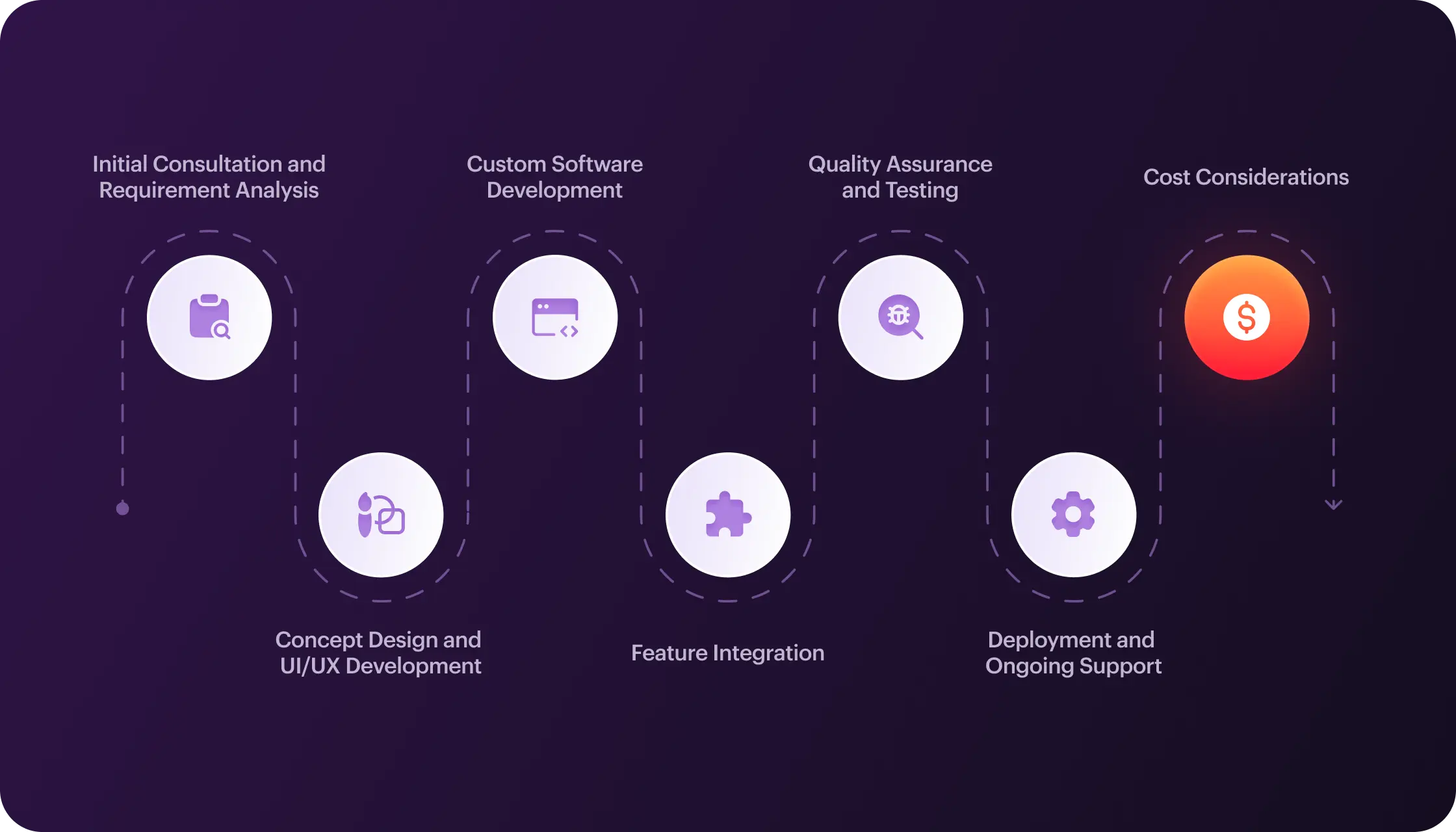Git, GitHub and GitLab: Which is the Best in 2025?

The right tools in software development can make or break your setup fundamentals, especially when it comes to open-source control systems. If we take GitHub, it thrives as a collaborative hub for open-source innovation and hosts giants like TensorFlow and React. About 58% of GitHub users adopt third-party Actions.
Meanwhile, GitLab attracts teams that value privacy and automation. About 73% of its users use the built-in CI/CD pipelines.
But what is the difference between GitHub and GitLab on a deeper level, and why does this choice matter in 2025?
- Community: By late 2024, GitHub hit 4.5 billion contributions globally. For context, that’s 12,328 commits per minute.
- Trust: Over 90% of Fortune 100 companies use GitHub for key code. They appreciate its ecosystem for scalability and easy third-party integrations.
- Network: GitHub has over 1 million active monthly contributors from North America, Brazil, India, and China. This setup makes cross-border teamwork easy, which is great for distributed teams.
- Compliance: GitLab reduces audit prep time by 40% for regulated industries like healthcare.
This article breaks down the key features, security protocols, and real-world performance. It helps you choose the right platform for your 2025 strategy. Focus on what matches your goals, not just the latest trends.
Git vs GitLab vs GitHub: The Basics
Both platforms are made to streamline software development. They provide various tools for version control, continuous integration, and teamwork. Let's start with a closer look at each platform.
What is Git?
Git is a free and open-source distributed version control system used by teams worldwide. It works equally well for minor fixes and large projects. Unlike older systems,
Git gives every developer a complete project copy, making teamwork faster and more flexible. Git runs smoothly even on basic computers, outperforming tools like Subversion and Perforce with features like cheap local branching, convenient staging areas, and multiple workflows.

Key Features of Git
- Distributed Development: Each developer has their full local copy of the repository and all its history. This allows offline work and eliminates reliance on a central server.
- Snapshots Over Diffs: Git keeps data as snapshots of the entire project. This method helps with efficient storage and quick retrieval.
- Branching and Merging: Git lets developers create lightweight branches. This way, they can experiment on their own. Later, they can merge changes easily into the main codebase.
- Performance: Git is optimized for speed, which makes operations like committing, branching, merging, and comparing versions highly efficient.
- Collaboration: Its distributed nature allows multiple developers to work simultaneously without conflicts. Changes can be reviewed, tracked, and merged quickly.
- Data Integrity: SHA-1 hashing checks every file change. This ensures the data stays intact and avoids corruption.
What Is GitLab?
GitLab is an open-source DevOps platform. Built on Git (the same system GitHub uses), it’s designed to help teams manage every step of creating apps or programs—from brainstorming ideas to launching updates. It offers project planning, continuous integration/continuous deployment (CI/CD), security testing, and monitoring.
From conception to implementation, GitLab leads the way and helps teams reduce the development cycle from weeks to minutes. As a result, teams cut costs, accelerate time-to-market, and create more secure and standards-compliant software.

Who Created GitLab?
Frustrated by too complex or unreliable tools, GitLab co-founder Dmytro Zaporizhets decided to build something that just worked. In 2011, right from his home in Ukraine, Dmytro teamed up with Valeriy Sizov to create GitLab. Their first code commit on October 8, 2011, marked the start of a platform that would grow into a global DevOps powerhouse.
What began as a personal project to simplify collaboration has since transformed how teams worldwide build, test, and deploy software.
Many wondered—is GitLab owned by Microsoft? No, GitLab is not owned by Microsoft. The owners of GitLab Inc. include institutional investors, internal shareholders of the company, and a broad range of private investors. Microsoft acquired GitHub in 2018, one of the most popular code-hosting platforms. However, they remain independent companies despite GitLab and GitHub operating in a similar field. GitLab continues to operate separately, offering its own set of tools and services for DevOps.
Features of GitLab
- Planning. Powerful tools help unite all process participants. They set up work using epics, groups, stages, and roadmaps. You can also see progress in real-time.
- Maintenance. Built-in issue tracking and support system for continuous feedback within DevSecOps processes.
- Design Management. Centralized storage for project materials helps teams work together. It allows them to improve the product quickly during development.
- Requirements Control. Established requirements management system.
- Product Quality. Track testing, analyze results, and adjust processes directly on a single platform.
- Wiki. Each GitLab project comes with its own wiki. This allows users to easily create, store, and manage documentation alongside their code.
- Text Editors. GitLab offers two types of editors: Plain Text Editor (PTE) and Rich Text Editor (RTE). Both are key to the Knowledge Group's plan to turn GitLab into a full AllOps platform.
- Value Stream Management. The system tracks key metrics throughout all stages of development. It analyzes how efficient the process is and finds bottlenecks. Comparing best practices among teams helps improve workflows. This leads to faster, more valuable solutions for users.
- DORA Metrics. Tracking and visualizing DORA metrics helps teams make smart, data-driven choices. This boosts efficiency in their DevOps processes.
- DevOps Reports. GitLab’s flexibility makes it suitable for both small teams and large enterprises, providing simple and effective management from Waterfall to DevSecOps.
Pros and Cons of GitLab
GitLab vs GitHub remains among the best solutions for DevOps due to their extensive automation capabilities and user-friendly tools for efficient team collaboration.

What Is GitHub?
GitHub is a platform for code storage, collaboration, and version control. It allows you and other developers to collaborate on projects, coordinate changes, and improve the code. The GitHub website and app have version control, source code management, and change-tracking features.
The fundamentals of the platform are the Git system. GitHub serves as a space for developer to interact and share their projects. It remains the most popular version control system (VCS) in programming due to its user-friendly interface, open structure, and ease of use.

Who Created GitHub?
The idea of GitHub originated in 2005 thanks to Finnish-American software engineer Linus Torvalds. Looking for an efficient way to manage Linux code, he created Git, which took just over a week. Git became a distributed version control system with open-source code.
Unlike previous solutions that stored code in a single repository, Git allows each user, regardless of location, to view the source code, history of changes, bug fixes, and integration plans. GitHub developed this idea by creating a single open platform for developers to collaborate to view different projects and improve their code.
The gap between the creation of Git in 2005 and the launch of GitHub in April 2008 became a period when new users gradually learned the system. Their work was coordinated by the lead maintainer, Japanese programmer Junio Hamano. Torvalds acknowledges that Hamano made the most significant contribution to Git's improvements.
Features of GitHub
- Community: GitHub is known for its active developer community and many open-source projects.
- GitHub Copilot: GitHub offers an AI-powered code completion tool called GitHub Copilot that provides code suggestions directly in the editor, significantly increasing developer productivity.
- Packages: GitHub integrates package management into the platform, allowing users to host and manage software packages and use them as dependencies in other projects, all within GitHub.
- Security and code scanning: GitHub provides security tools like Dependabot for automated dependency update code and secret scanning.
- Integration with third-party tools: GitHub offers many integrations with popular development tools such as Slack, Trello, etc.
- Community: GitHub is known for its active developer community and many open-source projects.
- GitHub Copilot: GitHub offers an AI tool known as GitHub Copilot. It gives code suggestions right in the editor, which helps developers work faster and more efficiently.
- Packages: GitHub lets users manage packages right on the platform. You can host your software packages and keep them organized. Plus, you can use these packages as dependencies in other projects, all in GitHub.
- Security and code scanning: GitHub has tools like Dependabot. It automates updating dependencies and scans for secrets.
- Integration: GitHub easily connects with third-party tools like Slack and Trello.
Pros and Cons of GitHub
Let's consider the key differences between GitHub vs GitLab.

Git vs GitLab vs GitHub: Similarities
Both platforms from our GitLab vs GitHub comparison have a lot in common, making them popular choices for developers:

Thus, we conclude they have many similarities when comparing GitLab vs. GitHub.
Key Difference Between Git, GitHub, and GitLab
Are GitHub and GitLab the same? Despite the similarities, there is a critical difference between Git, GitLab vs GitHub:

Thus, consider these differences between Git vs GitHub vs GitLab when working on your project.
Git, GitHub, and GitLab Cost in 2025
Let's look at Git vs GitHub vs GitLab in 2025.
- Git—free, open source.
- GitHub is offered with plans starting from $4 per user per month.
- GitLab vs GitHub is the more expensive platform, with plans starting at $21 per user per month.
This price difference between GitHub and GitLab reflects GitLab's focus on integrated DevOps features and enterprise-grade solutions. That is why it is higher. However, it's important to note that GitLab offers a transition price of $24 per user per month for existing Premium customers renewing within the first year after the price increase.
Git vs GitLab vs GitHub: Which Is the Best Option?
In short, the choice between GitLab vs. GitHub depends on your project's specific needs. However, diving deeper, we will see that GitHub is widely favored for open-source projects, individual developers, and small to medium-sized teams. This is because of its large community, ease of use, and extensive third-party integrations. These features make it ideal for quick collaboration and straightforward workflows, particularly for those who put accessibility and a vibrant ecosystem first.
On the other hand, GitLab caters to large enterprises and teams that look for a robust, all-in-one DevOps platform. Its built-in CI/CD pipelines, self-hosting flexibility, and advanced project management tools streamline complex workflows. Plus, many organizations with intricate development and deployment needs hugely benefit from GitLab.
Meanwhile, hosting options differ: GitHub operates exclusively in the cloud, while GitLab offers both cloud-based and self-hosted solutions, granting greater control over infrastructure.
GitHub’s strength lies in its vast array of third-party plugins and integrations, which simplify extending functionality. Meanwhile, GitLab emphasizes deep, native integration with DevOps tools, reducing reliance on external services. For open-source collaboration or rapid project initiation, GitHub remains the top choice. On the other hand, GitLab excels in managing advanced CI/CD processes and meeting enterprise-scale demands, positioning it as the go-to for teams needing end-to-end DevOps automation and customization.
After all, selecting a platform hinges on your project’s unique needs—not just features. Evaluate team size, integration requirements, and CI/CD workflows to choose the best fit.

GitLab and GitHub Alternatives
In fact, GitLab and GitHub are not the ones that thrive in the effective management of repositories. Some of the alternatives of GitLab and GitHub are:
- Bitbucket: Offers integration with Jira, making it convenient for teams that use this tool for project management. In addition, Bitbucket supports Mercurial, which can be helpful for teams using this version control system.
- SourceForge: This site is famous for open-source projects and has an extensive software archive. It allows users to host projects and provides tools for version management and code collaboration, which makes it attractive for open-source developers.
- Azure DevOps: This is a comprehensive platform for DevOps from Microsoft that provides a complete set of tools to manage application development, testing, and deployment. Azure DevOps integrates with other Azure services, making it an excellent choice for organizations already using Azure infrastructure.
Conclusion
Undeniably, both GitLab and GitHub stand as powerful tools for managing repositories that have transformed how software is developed and shared.
GitLab excels with its DevOps toolkit and granular control, while GitHub offers a streamlined developer experience and unmatched open-source reach. In addition to these two popular options, it is worth mentioning other platforms such as Bitbucket, SourceForge, and Azure DevOps, each with its characteristics and advantages.
To find out which will fit your needs perfectly, evaluate the specifics of your project, integration requirements, and number of participants. With the right choice of platform, you can boost the team's efficiency, ensure the final product's quality, and contribute to the success of your project as a whole.
FAQ
GitHub is generally better for open-source projects due to its large community, extensive integrations, and user-friendly interface.
GitHub’s user interface is simpler and more user-friendly, making it easier for beginners to navigate, especially for those new to version control.
GitLab’s free version might be more cost-effective for small teams due to its extensive features, while GitHub’s free plan is more limited.
The choice depends on your project’s needs: GitLab is better for comprehensive DevOps workflows and self-hosting, while GitHub is ideal for ease of use, community support, and open-source contributions.
Connect with us
.webp)
We are a tech partner that delivers ingenious digital solutions, engineering and vertical services for industry leaders powered by vetted talents.

















